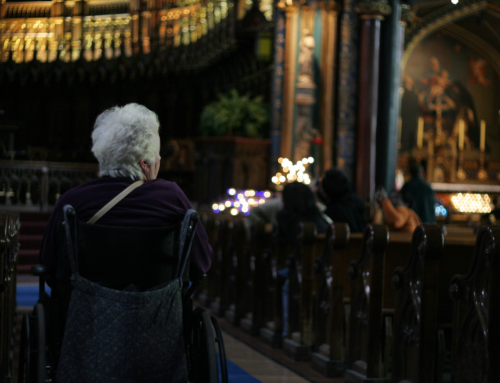But God chose you to be his people. You are royal priests. You are a holy nation. You are God’s special treasure. You are all these things so that you can give him praise. God brought you out of darkness into his wonderful light.
1 Peter 2:9 NIV
Some people who have disabilities struggle to see themselves reflected in 1 Peter 2:9 because of some prohibitions found in Leviticus and warnings of the prophets that appear to associate disability with sin or a curse. Jesus does a lot to counteract these associations: In Luke 2 able-bodied people who are preoccupied with their own concerns are uninvited to the great banquet, while people with various limitations are welcomed in as they are; In John 9 when people inquire as to whether a man was born blind because of his sin or his parents’ sin Jesus clearly states that it is neither, “…this happened so that the works of God might be displayed in him.”(John 9:3 NIV).
Restoring people’s relationship to God was and is Jesus’ primary emphasis throughout the Gospels. We see this when Jesus says to a paralyzed man “my son, your sins are forgiven,” followed by “pick up your mat and walk.” Mark 2:5-9. The miracle cure was to demonstrate God’s power, and that the man’s healing, the restoration of his relationship with God, had already taken place.
Christians with and without disabilities commonly overlook these important details in Scripture. One of the reasons I am especially grateful to writers and producers of The Chosen series is for their faithful portrayals of various Bible characters with different disabilities throughout the series, and for their insight into how some of Jesus’ disciples might have very well been people with disabilities. In so doing they show that people with disabilities do not need to be cured in order to follow Jesus or to serve him well.
- True to the gospel narratives The Chosen shows the paralyzed man who is lowered through the roof being cured and the leg function of a man at the pool of Bethesda being restored by Jesus.
- True to the lives of many believers with disabilities, through the character of Shula, a woman who is blind, writers and producers of The Chosen demonstrate that not every person with disabilities who encounters Jesus desires that he cure them.
- The Chosen also presents some of the fear, pain and mental anguish that Mary of Magdala might have had to deal with before Jesus “helps” her. The Chosen prevents viewers from maintaining a one-dimensional perspective of her by showing that she could have suffered from much grief as a child: she may have also been a victim of gender-based violence and poverty.
- In the series even after Mary of Magdala experiences emotional and psychological healing there are times when she experiences fear and flashbacks. This realistically combats potentially damaging theology of many believers today which asserts that psychiatric survivors or people who have mental health challenges only need to pray and their challenges will go away.
- Matthew, the tax collector who becomes a disciple, is portrayed as someone who may be on the autism spectrum: The Chosen shows how aspects of this such as being detail oriented, meticulous and good with numbers might have been gifts in various circumstances.
- In a scene where many people are waiting in line for Jesus to heal them and Matthew is trying to memorize Torah, Philip declares that “no amount of learning can bring you closer to God or make you more precious to him.” This may be a powerful reminder for anyone who tends to intellectualize their faith. It also models acceptance of people, regardless of intellectual ability or disability. It could impact many churches’ perspective on their requirement of a verbal declaration of faith.

An article featuring Jordan Walker Ross, the actor who plays “Little James,” noted that in his audition, creator and director, Dallas Jenkins did not notice Ross’s scoliosis and mild form of cerebral palsy. If you think such an encounter is unusual you would be right. I wonder if Jenkins was inspired by the Holy Spirit not to take notice of Ross’s disability at first. I wonder this because I think it models Jesus’ approach to disability.
I agree with Christian disability advocate Judith Snow who proposed that God did not create people with disabilities and people without disabilities. Rather, he created some people who are good at some things and other people who are good at other things. Humanity created the categories of disabled and nondisabled and these categories are rather arbitrary if not wrong.
I have known actors without disabilities who are hired to play characters with disabilities which is in many ways unjust: I have also known actors with disabilities like Ross who are not cast on account of their disability which seems unjust in other ways. In contrast, rather than recasting, after Ross’s challenges were observed they were thoughtfully incorporated into his character’s script. They form the basis for a meaningful, seemingly authentic dialogue about self acceptance between the characters Thomas and “Little James.”
Any person who recognizes their limitations or flaws could be encouraged by that dialogue. I think that it held additional meaning for me because I feel any combination of frustrated, exhausted and alienated when people I do and don’t know approach me with questions like, “what’s wrong with you?” Or “why hasn’t Jesus healed you?” It was invigorating for me to see someone like me, who doesn’t desire a cure for cerebral palsy, alongside a long lineup of people waiting to be cured. It was empowering for me to see a TV character, a Bible character, a disciple no less, fielding these questions that I myself have been frustrated by and am at times reluctant to answer.
I appreciate how “Little James” wrestles with the idea that the experience of healing should not be a prerequisite for following Jesus. He also points out the importance of whether or not someone has the desire to be cured, as well as the concern that if little James draws attention to his “struggle” (which the show does not refer to as a disability) Jesus and others may lose confidence in him or reject him.
Thank you to all those who work on The Chosen, but especially to Jenkins and Ross for offering a window into some deeper concerns of many (but not all) faithful people with disabilities. I might not have to work as hard to explain or prove self acceptance to those who watch The Chosen.
I pray that The Chosen will continue to help people with and without disabilities “Come and See” themselves and others the way that Jesus does. May the writers and producers continue to shed light on different people’s needs for healing, curing or self acceptance. May we all come to see how diverse characteristics can be strengths or gifts rather than disabilities in various contexts.


